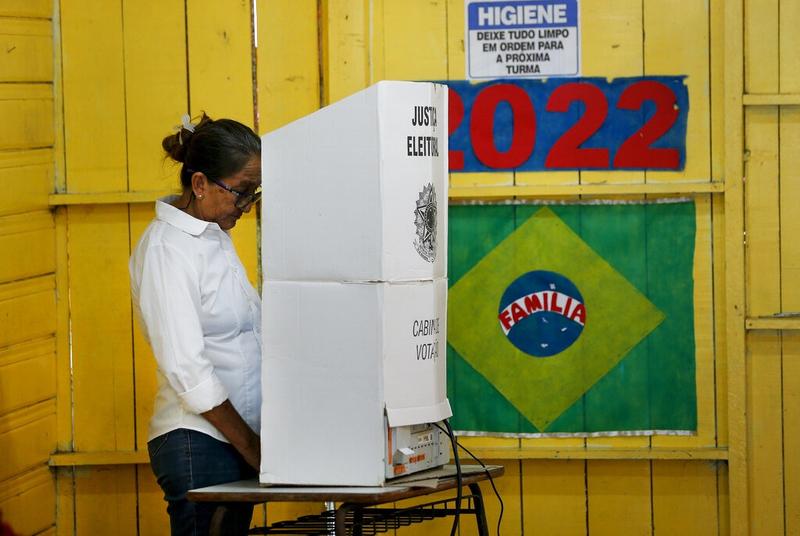Remarkable political comeback gives President Bolsonaro’s challenger Lula an edge
 A woman votes at a polling station during general elections, in Lago de Catalao, Amazonas state, Brazil, Oct 2, 2022. (EDMAR BARROS / AP)
A woman votes at a polling station during general elections, in Lago de Catalao, Amazonas state, Brazil, Oct 2, 2022. (EDMAR BARROS / AP)
Brazil’s former president Luiz Inacio Lula da Silva, 76, and the incumbent President Jair Bolsonaro, 67, will face off in a runoff election on Oct 30 after neither secured enough votes for a win at the polls on Oct 2.
Lula da Silva (known simply as Lula), left-wing leader of the Workers’ Party, managed a remarkable political comeback and a lead with 48.4 percent of the vote. Bolsonaro, a populist who leads the right-wing Liberal Party, obtained 43.3 percent. Brazil’s electoral rules require a candidate to win at least 50 percent of the vote to avoid a runoff.
Almost 123 million people cast votes on Oct 2. The election was marked by long lines at polling stations, with voting mandatory for people aged 18 to 70. Many waited in line for up to two hours to cast their ballots.
Votes were also cast for members of the lower house of Congress, and for about a third of members of the Senate. After the election, Bolsonaro’s Liberal Party appeared poised to have the highest number of members in the lower house of Congress and the Senate, but not a majority in either house.
At the state level, governors and members of regional legislative assemblies were also elected — with some runoff elections expected for those too. All the runoffs will be held on Oct 30.
Despite Lula da Silva’s lead in the polls, the close call on Oct 2 lets Bolsonaro retain hope of holding on to power.
“Lula won with more than 6 million votes of difference, and this is important. It is not a small win; it is not a small difference. Lula still can win in the runoff, but things will become harder and harder,” Joao Cumaru, a political scientist based in Recife, told China Daily.
The actual results at the polls were quite different from the projections.
“Many institutes must change their methodology ... many surveys were very distant from the results we saw in the polls,” Sergio Moro, a former minister of justice in Bolsonaro’s government who was elected as a congressman on Oct 2, told Brazilian television as the results became known.
Moro was the prosecutor in a case that led to Lula being sentenced to 12 years in prison in 2018. He served 19 months before the sentence was overturned in 2019. He was only able to run because the charges were vacated. The fact that he now has a significant chance of becoming president again marks a remarkable change of fortunes for Lula, a subtext seen throughout the campaign.
Two other candidates, Ciro Gomes and Simone Tebet, obtained over 3 percent and over 4 percent of the vote respectively. Their support could now tip the balance to any of the two candidates in the runoff.
“Lula will have to ask for more support from other parties, from the center, and maybe he can announce the name of his minister of the economy. If he does that, he will obtain more support,” said Cumaru.
Daniel Zovatto, regional director at the International Institute for Democracy and Electoral Assistance, a global intergovernmental organization that monitored the election, said: “This result prevents Bolsonaro from continuing with his discourse that the guarantees were not given, that the process was not transparent, that the electronic ballot box was not credible.”
Bolsonaro threatened for months to not recognize the results of the elections and cast doubts on the legitimacy of the polls.
“The legitimacy of the electoral process has been given and therefore, it commits President Bolsonaro to play by the rules of the game. This is good news for the Brazilian democracy,” said Zovatto.
Whoever wins the runoff at the end of the month will face a complex political and economic situation. The economic recovery process, inflation and balancing fiscal expenditures are just some of the challenges ahead. Another will be helping the 33 million Brazilians who live in poverty. Yet another will be the protection and recovery of the Amazon rainforest.
On the international front, a Lula victory could help renew Brazil’s leadership position in the continent, with many left-leaning presidents in the region, such as Alberto Fernandez in Argentina, Gustavo Petro in Colombia, Gabriel Boric in Chile and Nicolas Maduro in Venezuela, holding similar ideological positions. Lula may find the momentum to rebuild strategic regional alliances in terms of trade, defense, environment, mobility and social issues.
A Bolsonaro win, on the other hand, could keep the country somewhat isolated from other countries in the region.



